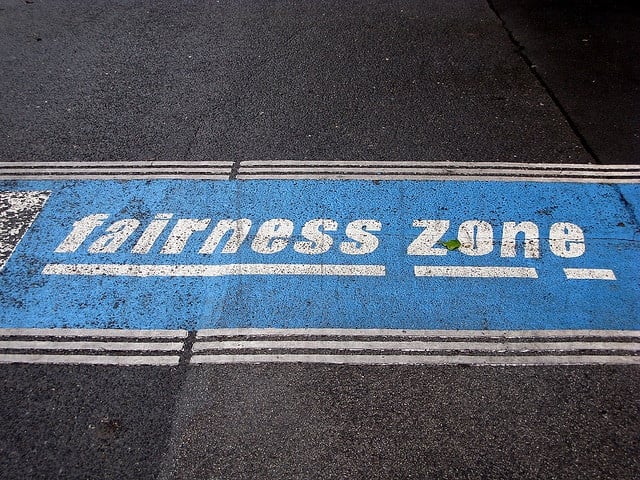
by Meredith (USA) | Sep 26, 2014 | 2014, Awareness, Communication, Family, Kids, Motherhood, Parenting, Siblings, USA, World Motherhood, Younger Children
 If you will have, do have, or have ever had a nine year old boy in your life, you have probably heard this ever common, often blood curdling statement, “That’s not fair!” I hear it multiple times a day from my own nine year old son. I thought it was a phrase which would never end, and apparently even, we, as adults, struggle with perceived unfairness in our own lives quite often. (more…)
If you will have, do have, or have ever had a nine year old boy in your life, you have probably heard this ever common, often blood curdling statement, “That’s not fair!” I hear it multiple times a day from my own nine year old son. I thought it was a phrase which would never end, and apparently even, we, as adults, struggle with perceived unfairness in our own lives quite often. (more…)
Meredith finds it difficult to tell anyone where she is from exactly! She grew up in several states, but mainly Illinois. She has a Bachelor of Science degree in Elementary Education from the University of Illinois at Champaign/Urbana which is also where she met her husband. She taught kindergarten for seven years before she adopted her son from Guatemala and then gave birth to her daughter two years leter. She moved to Lagos, Nigeria with her husband and two children in July 2009 for her husband's work. She and her family moved back to the U.S.this summer(August 2012) and are adjusting to life back in the U.S. You can read more about her life in Lagos and her adjustment to being back on her blog: We Found Happiness.
More Posts

by Shaula Bellour (Indonesia) | Sep 25, 2014 | 2014, Childhood, Expat Life, Family Travel, Holiday, Indonesia, Shaula Bellour, Twins, UK, Uncategorized, USA
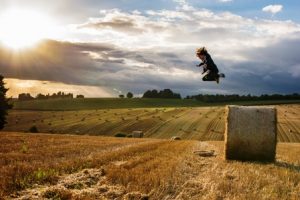 From the window, I can hear high-pitched giggles and the sound of wellington boots on garden path gravel.
From the window, I can hear high-pitched giggles and the sound of wellington boots on garden path gravel.
My daughter is next door with her new neighbor friend, pretending that the garden shed is an animal rescue center and the backyard chickens are actually wild monkeys. My son is bouncing on a trampoline with the friend’s big sister and I can see their carefree bodies flying above the wheat fields, in the shadow of the village church.
It’s past their usual school-night bedtime, but the sun is still high and we’ve stopped keeping track of these things anyway. Evidence of the day’s activities is scattered on the grass: badminton birdies, a rainbow of half-finished loom band bracelets, a decorated cardboard lean-to and sticky signs of an earlier snail race.
Both kids return with dirty feet and ice cream on their faces and I’m pretty sure they forgot to wash their hands after petting the donkey across the road. But it’s okay. It’s the summer holidays in rural England and it feels like the stuff childhood is made of. The only catch is that it’s not where we live…
Life is a series of trade-offs.
Back in Jakarta, we’re on our way to school and my children want to know why we don’t live in England. “Well…because we live here”, I respond simply, feeling a sharp pang of guilt. I go on to explain that day-to-day life in England would probably be different than the idyllic summer version. For example, instead of playing all day, they would have to go to school and soon the long sunny days would turn cold and wet. “That’s okay!” they chirp, happily unconvinced.
Luckily the conversation shifts and together we watch the city float past our car window. The daily mosaic of life here is colorful, chaotic and always fascinating. We read shop signs, point out our favorite kaki lima food carts and compete to find the most interesting motorcycle cargo…from pallets of baby chicks to enormous balloon bundles.
We talk about their new school classes and where all the children are from, realizing that there are nearly as many nationalities as students. We think about where we might like to travel for their half-term break and marvel at how lucky we are to be so close to so many amazing destinations.
Life is a series of trade-offs.
Sometimes, I feel sad about the fact that our children are growing up so far away from their grandparents, aunts, uncles and cousins. But then I am also reminded that since our family is both British and American, we will always be far from someone we love regardless of where we live. We do the best we can to stay connected and are grateful for the precious time we get to spend together.
Occasionally, I see photos of my friends’ frolicking children and feel a twinge of regret that my own kids are missing out on the places and experiences I enjoyed as a child growing up in the US.
But then I examine my own assumptions…does their childhood need to resemble my own for it to be good? Of course not. My children may not learn to ski anytime soon, but they are seeing and doing so much more than I ever dreamed of at their age.
Life is a series of trade-offs.
I tell myself that we are lucky to enjoy the best of both worlds. But in reality, we can’t have it both ways.
This is the path we’ve chosen and there are limitations as well as benefits. Accepting these trade-offs brings a certain kind of relief and shifts the focus — emphasizing what we have instead of what we’re missing.
It’s a process, but I’m getting there.
How do you and your family balance life’s trade-offs?
This is an original post for World Moms Blog by Shaula Bellour.
Photo Credit: ClairOverThere. This image holds a Flickr Creative Commons attribution license.
Shaula Bellour grew up in Redmond, Washington. She now lives in Jakarta, Indonesia with her British husband and 9-year old boy/girl twins. She has degrees in International Relations and Gender and Development and works as a consultant for the UN and non-governmental organizations.
Shaula has lived and worked in the US, France, England, Kenya, Eritrea, Kosovo, Lebanon and Timor-Leste. She began writing for World Moms Network in 2010. She plans to eventually find her way back to the Pacific Northwest one day, but until then she’s enjoying living in the big wide world with her family.
More Posts

by Jennifer Burden | Sep 24, 2014 | 2014, International, Social Good, World Voice
Following the Social Good Summit, World Moms Blog was invited to a private event focused on the immediate humanitarian need to contain and eradicate the Ebola virus. It was eye opening, and we can’t wait to share what we learned and what actions everyday citizens can take…
“We have to get ahead of this crisis.” — Carolyn Miles, CEO of Save the Children on the Ebola outbreak in West Africa.
Carolyn Miles, CEO of Save the Children, reported that her organization is working in all three countries with the most Ebola cases: Guinea, Liberia and Sierra Leone. Ebola has a high fatality rate and isolation helps calm the virus down. Children are being orphaned at an increasing rate, and burial practices and safety are of importance, as the virus is still active after death. As the crisis increases, Miles says the goal is to also increase the amounts of Ebola Community Units (EBCs) that Save the Children has been setting up.
The introduction of an EBC gives aid workers the ability to work with people in the communities affected to increase trust in the treatment of the dangerous virus and helps get people out of their homes to decrease the chance of infecting family members. Miles also noted that the governments of the US and the UK are also running treatment centers in the countries affected.
Christopher Elias, President of Global Development at The Bill and Melinda Gates Foundation, describes the space and scope of Ebola “unlike anything they have seen.”
This is the first outbreak in Western Africa and the 1st in urban areas. In fact, just two weeks ago, The Bill and Melinda Gates Foundation ear tagged $50 million dollars to go toward eradicating Ebola. By the time they had made the announcement, they had already handed out the first $13 million, which indicates the urgency of the need, according to Elias. The $50 million commitment is the largest Gates has made to a humanitarian crisis. This is just the beginning, as $1 billion is needed to complete the mission, according to the ONE Campaign. Christopher Elias explains the 4 part strategy for the Ebola funding, as follows:
The 1st part of the strategic plan for where the Gates money will benefit is to partners such as the U.S. Centers for Disease Control (CDC), the World Health Organization (WHO) and others. In fact, the first $1 million was allotted to UNICEF.
The second step is to fund research, as there is a need for both, a cure and a better test to diagnose Ebola.
Third, the strategy is focused at the country level.
Something very unique to controlling this outbreak is the use of health systems previously in place from the efforts to eradicate polio in Lagos, Nigeria.
The capital city had 19 cases, but health workers were able to control it quickly. Same was true for Senegal, where there was one case that was rapidly contained. Part three of the strategy will be how resources in countries affected can be complemented to help.
And the fourth part of the financing strategy for the Gates commitment is to join partnerships with the CDC and others to calculate which countries will be at risk for the spread of Ebola. Identifying and anticipating where Ebola could travel next, will help those countries prepare if the virus does indeed arrive. As already mentioned, the quicker the containment of the disease, the less likely it is to spread.
Carolyn Miles noted that where there are no health systems intact, in the more rural areas, there is the most risk of the virus spreading. In the more urban areas, as mentioned, the legacy of the polio eradication efforts are already in place to contain and treat Ebola.
We also heard from Jamie Drummond, co-founder of the ONE campaign, who pointed out that strengthening the economies in countries vulnerable to the disease is important. The world needs more sustainable systems, and, in fact, according to Drummond, it is estimated that $1 billion is needed for the Ebola crisis. He explained that the money could come from GAVI, but that would come at the expense of endangering the vaccination programs already planned to prevent other deadly diseases. Realistically, we need to deal with Ebola AND get GAVI the money it needs to carry on it’s already life-saving work.
The three countries currently affected by Ebola have significant natural resources. Had these natural resources been managed well in the past, the money to combat the virus would be here today. ONE insists that we need long-term investments in functioning economies.
On that note, we were told about the “Publish What You Pay” campaign to expose corruption and unveil money laundering schemes. In many countries throughout Africa there is no budget transparency, and citizens cannot see how the money is used. This campaign is working hard toward better functioning economies in Africa.
Towards the end of the conference, actor Idris Elba, famous for his role as Nelson Mandela, among others, arrived. Having roots in Sierra Leone and Ghana, he explained that he is dedicated to lend his celebrity to help the crisis in West Africa. He also noted that the Sierra Leone economy has been slashed by over 30% and that 75% of the Ebola victims are young women, who are more likely the caregivers for people suffering from the virus. In addition, he explained that in Sierra Leone there is a large group of thousands of young adults mobilized and going door to door to give out information about Ebola. But, this group is heavily fatigued. Elba is hoping to rally them forward.
World Moms, Elizabeth Atalay, Kyla P’an and myself, left the conversation briefed on just how large of a problem Ebola is and can be, and the importance of immediate action.
Three Steps YOU can take to help #ENDEBOLA right now!!!
1.) Sign this petition to tell world leaders to ACT on Ebola now!
2) Donate. Every little bit helps, to organizations on the ground, such as Save the Children.
3) Share. Download this image and share on Facebook, Twitter, Instagram, etc.:
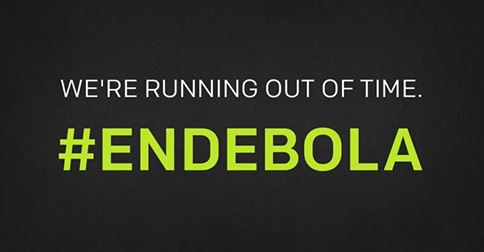
Together, we can take action to save lives!
This is an original post to World Moms Blog by founder, Jennifer Burden, in New Jersey, USA.
Image credit to ONE.org.
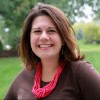
Jennifer Burden is the Founder and CEO of World Moms Network, an award winning website on global motherhood, culture, human rights and social good. World Moms Network writes from over 30 countries, has over 70 contributors and was listed by Forbes as one of the “Best 100 Websites for Women”, named a “must read” by The New York Times, and was recommended by The Times of India.
She was also invited to Uganda to view UNICEF’s family health programs with Shot@Life and was previously named a “Global Influencer Fellow” and “Social Media Fellow” by the UN Foundation. Jennifer was invited to the White House twice, including as a nominated "Changemaker" for the State of the World Women Summit. She also participated in the One Campaign’s first AYA Summit on the topic of women and girl empowerment and organized and spoke on an international panel at the World Bank in Washington, DC on the importance of a universal education for all girls. Her writing has been featured by Baby Center, Huffington Post, ONE.org, the UN Foundation’s Shot@Life, and The Gates Foundation’s “Impatient Optimists.” She is currently a candidate in Columbia University's School of International and Public Affairs in the Executive Masters of Public Affairs program, where she hopes to further her study of global policies affecting women and girls.
Jennifer can be found on Twitter @JenniferBurden.
More Posts - Website
Follow Me:


by World Moms Blog | Sep 23, 2014 | 2014, ONE, Save The Children, Social Good, Social Media, World Moms Blog, World Voice
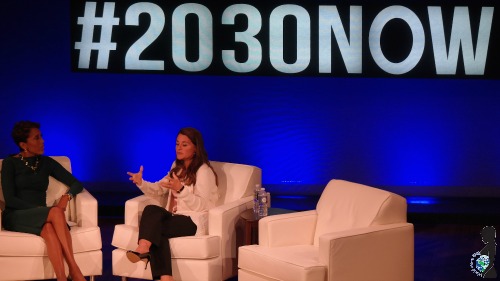
Melinda Gates being interviewed at the Social Good Summit in New York City on September 22, 2014.
“The Social Good Summit is the Grassroots equivalent of the UN General Assembly” – NY Times Journalist and author, Nicholas Kristof
Five editors from World Moms Blog attended the Social Good Summit in New York City this past weekend. So, what’s the best way to get a wrap-up of the event? We asked them all to tell us their highlights from the weekend. Here’s what they had to say…
Kyla P’an of “Growing Muses” and WMB Managing Editor responds,
Since I started writing and editing for World Moms Blog four years ago, I’ve been hearing about the Social Good Summit. Since the first time WMB founder, Jen Burden, attended — outfitted with baby sling and infant–back in 2011, I’ve been curious. Curious about the format, curious about the attendees, curious about the messaging. Today, I assuaged that curiosity by attending day two of the two-day summit. In concert with the United Nations General Assembly (UNGA to industries insiders), the Summit pulls together journalists, bloggers, foreign press, grass-roots activists and social entrepreneurs.
Together with fellow Sr. Editors, Elizabeth Atalay, Nicole Melancon and our tireless founder, Jen burden, we attended social enterprise boot camps, UN Foundation Fellows workshops, panel discussions and keynote addresses, interviews with philanthropists and entrepreneurs. The day was a series of sound bites. Presenters spoke for as little as five minutes or as long as 37. The topic and hashtag was 2030 Now but why that was chosen remains a bit of a mystery to me. And though I did not walk away from the actual summit feeling changed, I didn’t walk away unaltered.
Here are my three highlights: Robin Roberts interview with Melinda Gates; the Ugandan rappers Weasel and Radio who performed at the Every Woman, Every Child reception; and the exclusive briefing with Save the Children, the ONE Campaign, the Gates Foundation and actor Idris Elba. So would I drive eight hours round trip for 24-hours of Social Good again? In a heartbeat!
Jennifer Burden, Founder & CEO of World Moms Blog, says,
1. The Social Media Fellows lunch with Adepeju Jaiyeoba, a human rights lawyer and activist from Nigeria. Adepeju founded motherskit.org, which has distributed over 7,000 birth kits to mothers in Nigeria. Her passion for rocketing my interest in advocating for the health of women was contagious, tearful and inspiring all at the same time. And, yes, I know what you are thinking — we immediately connected her to World Moms Blog contributor, Kirsten Zalota of Cleanbirth.org, who distributes birth kits in Laos. They are planning a Skype chat already!
2. I found the conversations that came up in our Social Media Fellows session with MAMA on the topic of family planning important and sad. My wish is that more woman can have control over when they have babies and how many they have, which leads me to my only regret about the Summit — not being able to stay later in the evening for the Engender Health event, which launched the “WTFP?!” campaign, meaning, “Where’s the Family Planning?”. Engender Health has been working for decades towards maternal health and family planning, and this campaign focuses on women’s health in the developing world. I hope to hear more about their work on family planning in the future!
3. Seeing the Summit for the first time this year through the eyes of World Moms, Kyla P’an and Sarah Hughes. Kyla has been integral to the editing of our site for years, and I am thankful she joined us in NYC to experience the global conversations we both, report on and contribute to. Sarah, also new to the event, has been a social media editor at World Moms Blog. She covered the Summit on Sunday on our World Moms Blog Facebook page, and I can sum up her enthusiasm in a picture:
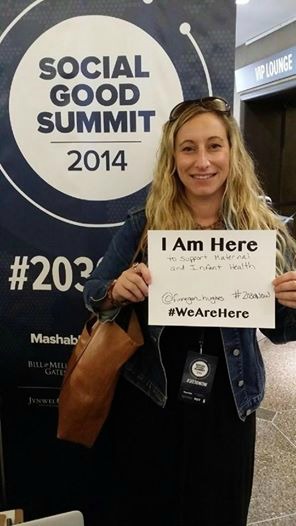
Awwwww! Go, Sarah, go!
World Voice editors, Elizabeth Atalay and Nicole Melancon, seasoned Social Good Summit attendees, were (as always!) active and important parts of global conversation!
Sarah Hughes of “Finnegan and the Hughes” and WMB Social Media Editor, writes:
I loved everything about Social Good Summit!! The air was filled with excitement and possibility. The overall vibe of changing the world was apparent and obvious. Here are my top three highlights from the event!:
1. Meeting Susan Can, Director of Corporate Equity in the Global Marketing for Johnson & Johnson. Susan and I had breakfast together and chatted about the importance of maternal health. We chatted about J&J mobile health iniative Text4Baby and how it is helping underserved mothers in the US.
2. Listening to Graca Machel telling us we must NOT leave any woman behind!! Hearing her speak with such authority and assertiveness in her tone really left me feeling like we CAN do this and we MUST!
3. I left feeling sad after the session on maternal and infant health and how far off we are on reaching MDG 4 and MDG5. My passion is maternal and infant health and it just seems like we are failing our world mothers by not doing better. Yes, some are trying but it’s just not enough and I want to know how to do more and WHAT to do!
Elizabeth Atalay of “Documama” and WMB Senior Editor, writes:
I had to stop and think when a friend asked what it was about the Social Good Summit that I loved so much. “Was it the connections, the panels, or the events surrounding it?”, she wondered. I decided that most of all it was the culture of the event, where the room is full of innovators and change makers that I find so inspiring.
The Social Good Summit makes me feel like I have a finger on the pulse of the Social Good movement.
I confess to at times being torn between socializing with all of the amazing people there doing cool things, sitting in the auditorium taking notes and hanging on every word of the amazing speakers in the line up, or catching sound bites, and photo ops in the media lounge. It is always refreshing to spend the couple of days with like minded global optimists as passionate as I am about making a difference in the world.
My highlights this year were:
1. Attending the Every Woman Every Child #MDG456Live event where we ran into our friend Phil Carroll from Save the Children, danced to Ugandan pop stars and then got to catch up with other World Moms and friends at an amazing South African restaurant.
2. Sitting in with the Social Good Fellows and Shot@Life director Devi Thomas to learn about another UN Foundation initiative the Mobile Alliance for Maternal Action referred to as MAMA.
3. Listening to my hero Melinda Gates talk about her plans for putting women and girls on the forefront of the global agenda and just being in close proximity to her greatness.
4. Getting a debriefing at a round table discussion with ONE, Save The Children and the Gates Foundation on the Ebola crisis from Actor Idris Elba, President of Save The Children Carolyn Miles, Jamie Drummond co-founder of ONE, and Dr. Chris Elias President of global Development for the Gates Foundation. Discussing the “Trillion Dollar Scandal” report on transparency, and the continuing Syrian refugee crisis.
As always I leave the Social Good Summit completely inspired and at the same time a bit overwhelmed with information. Amazing, powerful, and hopeful information.
Nicole Melancon of Thirdeyemom and WMB Editor says: This was my third year attending the Social Good Summit and each year it gets better and better. After two, highly intense and emotionally charged days I walk away inspired to use my voice to promote good and help change the world. For me, the key highlights were the fact that we are fortunate to live in a world where we have a voice so let’s use it. Let’s engage in the issues that mean the most to use, and use our voice to disrupt the system and ignite change. So many people around the world do not have this power and freedom to use their voice and now it is more important than ever to be heard. Where do we want to be in 2030 is up to us. So what kind of world do we want? It is up to us.
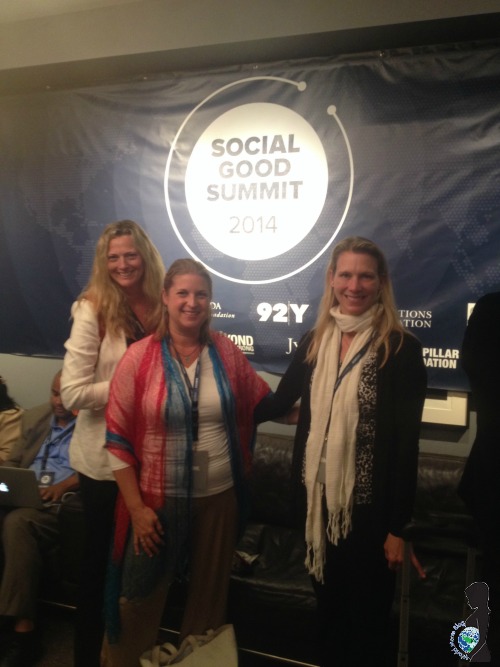
World Moms, Elizabeth Atalay, Kyla P’an and Nicole Melancon at the Social Good Summit in NYC.
World Moms Blog is an award winning website which writes from over 30 countries on the topics of motherhood, culture, human rights and social good. Over 70 international contributors share their stories from around the globe, bonded by the common thread of motherhood and wanting a better world for their children.
World Moms Blog was listed by Forbes Woman as one of the "Best 100 Websites for Women 2012 & 2013" and also called a "must read" by the NY Times Motherlode in 2013. Our Senior Editor in India, Purnima Ramakrishnan, was awarded the BlogHer International Activist Award in 2013.
More Posts

by Ann Marie Wraight | Sep 22, 2014 | 2014, Education, Government, Greece, School, World Motherhood
 Who hasn’t heard of the name Pythagoras before? Or, for that matter Archimedes, Aristotle, Plato or Hypatia? Even if you don’t know exactly what these people believed or taught, those ancient names probably ‘ring a bell.’ For those of you fortunate enough to have had a good level of education you will probably be familiar with the Pythagorean Theorem. Remember those maths lessons back then when we were teens? Most of you will recognise the above names as originating from Ancient Greece. Pythagoras, for instance, is best known as a mathematician who lived in the 500’s BC and also pursued knowledge in the fields of music and philosophy.
Who hasn’t heard of the name Pythagoras before? Or, for that matter Archimedes, Aristotle, Plato or Hypatia? Even if you don’t know exactly what these people believed or taught, those ancient names probably ‘ring a bell.’ For those of you fortunate enough to have had a good level of education you will probably be familiar with the Pythagorean Theorem. Remember those maths lessons back then when we were teens? Most of you will recognise the above names as originating from Ancient Greece. Pythagoras, for instance, is best known as a mathematician who lived in the 500’s BC and also pursued knowledge in the fields of music and philosophy.
Well, I’m really proud to live in a country which has such a history of academic and cultural excellence. In addition to the world of academia, remember that the first Olympic Games took place in Olympia in 776 BC! Can you imagine that? Most people think of the Games as being a much more recent creation. However, the concept of combining physical excellence and political and social benefits had its inception in Greece many centuries prior to the modern day games that we are currently familiar with.
So, with such an impressive and honourable history in sport, teaching and education, how does Greece’s glorious past influence its present generation of scholars?
Tragically, the politicians and educators who are responsible for the education system in modern Greece seem to have forgotten ancient past glories.
Pupils who want to continue to tertiary education really have to suffer years of hell in order to get the grades they need for university or colleges. The state education system has been a disappointment to teachers, parents and pupils for decades, REGARDLESS of which political party has been in power. Teachers are ridiculously underpaid considering the years of hard work and expense they’ve invested in getting their degree. Parents are forced to pay for private tuition and students miss out on many areas of their childhood due to running nonstop from day school to evening tuition.
There was a lot of publicity this summer when a bright 16 year old girl wrote a letter to parliament complaining that she was a human being and not a robot! She also expressed her fury that the new system implemented this year was EVEN WORSE than the previous one. Now students grades are counted in the last THREE years before finishing secondary school. That means if you mess up in one or two lessons when you’re 15/16, those grades will haunt you through school till you’re 17/18 and lower your whole grade average. You don’t have the option to rewrite the lesson either! Too much pressure for too many children. This both saddens and amazes me! Those who are responsible for the national curriculum are highly educated and experienced in their fields. So why has there been such a public outcry this year at the new “improved” system?
Well, quite frankly, it’s dreadful!
Virtually all Greek children who want to get good grades follow a similar programme. They go to their state run schools till around 2o’clock. As state secondary schools don’t have dining halls or refectories, the children then go home to eat lunch or take their own packed lunch to school. In the afternoon the lessons continue as most tuition in the day school isn’t adequate to prepare students for national exams. This means parents are obliged to hire private tutors, if the family budget can afford them, or children have to go back to “Frontisteria” or private tutoring schools. The second option is usually a little cheaper than the first. I know many families who have 2 children and the monthly tuition fees are at least ONE of the parents salaries. Imagine other families I know who have 3 or 4 children!!! It’s pretty common for parents to get bank loans or sell property for their offsprings education BEFORE they go to uni/college. The Greek State has prided itself for decades on its free education system. In practical and realistic terms, I don’t know any child who has entered university without doing private lessons, going to a private day school or following courses at the evening “Frontisteria.”
So the idea of a free Greek education system is a farce in reality. The tragic thing is that with a crushed economy, in some demographics we have an unemployment rate of 40-50%. Many families now have only one breadwinner and its not uncommon to have families with both parents out of work.
So how can these families afford education? Basically, they can’t. They have to rely on the goodwill of state school teachers to give extra homework or work through breaks to cover the material which comes up in state exams.
Their kids also have to make super human efforts on their own if they want any kind of realistic job prospects.
I’m a private tutor myself and some years ago I worked in the UK doing language summer schools. I had teens from all over the world but I remember that some of my shiniest stars were from Greece and Japan. The Greek kids were very knowledgeable in many areas and I assumed the Greek education curriculum must rock! That was just before I came to live here when I realised that those students usually came from middle class homes and could afford all the extra tuition not included in the state system.
So what’s happening internationally about our right to free education and knowledge until at least the age of 17/18? I’m British so I take it for granted that compulsory education should be till 16 and all levels of education should be free until the end of secondary school. Acquaintances from around the world have told me similar stories about education in their countries. The general consensus is that state curriculums are getting worse and trying to guarantee your child’s entry to tertiary education means forking out an awful lot of money! Friends in the USA, UK and Germany have put their children into private day schools or boarding schools. Colleagues who live in Denmark praise their system but this is only one that I know of personally which gets a glowing report!
I hope that your system isn’t like our Greek system.
As my ambitious 14 year old son says:”Going to school here is like being sent to PURGATORY!”
I’d be really interested to know about the education system in your part of the world. Do you have to pay fees or is everything provided by the government?
This is an original post for World Moms Blog by Ann Marie Wraight of Greece. Photo credit: Tom Brown. This picture has a creative commons attribution license.

Having lived in 4 different countries, Ann Marie finds it difficult to give a short answer about where she's from. She regards herself: Brit by birth, Aussie by nature, with a sprinkling of Greek and German based on her insatiable appetite for tasty food and chilled beer!
This World Mom has been married to her Greek soulmate for 16 years and they are the proud but constantly challenged parents of two overactive teenage boys. (She secretly wonders sometimes if she was given the wrong babies when she left the maternity clinic.) She can't explain the fascination and ability that her 13 and 14 year-olds show in math and physics or that both boys are ranked 1st and 2nd nationally in judo. Ann Marie can only conclude that those years of breastfeeding, eating home cooked meals and home tutoring really DO make a difference in academic and physical performance! The family is keeping its fingers crossed that---with the awful economic crash in Greece---continued excellence in math and/or judo will lead to university scholarships...
In addition to writing, enjoying a good glass of wine and movies, Ann Marie also works as a teacher and tends their small, free-range farm in the Greek countryside.
More Posts

by Kirsten Doyle (Canada) | Sep 19, 2014 | 2014, Autism, Canada, Humanity, Older Children, Parenting, World Motherhood, Younger Children, Youth
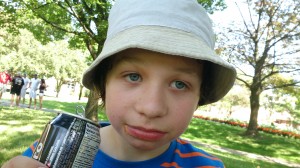 This week, a story in the news made me cry. It was not the kind of story that makes it big in the mainstream media. It was not about mass devastation or loss of life, war or missing jetliners. It was, however, a story that has a big impact in my little corner of the world: the autism community.
This week, a story in the news made me cry. It was not the kind of story that makes it big in the mainstream media. It was not about mass devastation or loss of life, war or missing jetliners. It was, however, a story that has a big impact in my little corner of the world: the autism community.
What happened was that a pair of teens persuaded a 15-year-old boy with autism to participate in the ALS Ice Bucket Challenge. They sold him on how generous it would be, how cool it would be, how fun it would be. As he stood there trustingly, expecting to be drenched in freezing cold water, the teens poured a bucket filled with human feces and urine all over him. (more…)

Kirsten Doyle was born in South Africa. After completing university, she drifted for a while and finally washed up in Canada in 2000. She is Mom to two boys who have reached the stage of eating everything in sight (but still remaining skinny).
Kirsten was a computer programmer for a while before migrating into I.T. project management. Eventually she tossed in the corporate life entirely in order to be a self-employed writer and editor. She is now living her best life writing about mental health and addictions, and posting videos to two YouTube channels.
When Kirsten is not wrestling with her kids or writing up a storm, she can be seen on Toronto's streets putting many miles onto her running shoes. Every year, she runs a half-marathon to benefit children with autism, inspired by her older son who lives life on the autism spectrum.
Final piece of information: Kirsten is lucky enough to be married to the funniest guy in the world.
Connect with her on Facebook, Twitter and Instagram.
Be sure to check out her YouTube channels at My Gen X Life and Word Salad With Coffee!
More Posts
Follow Me:




 If you will have, do have, or have ever had a nine year old boy in your life, you have probably heard this ever common, often blood curdling statement, “That’s not fair!” I hear it multiple times a day from my own nine year old son. I thought it was a phrase which would never end, and apparently even, we, as adults, struggle with perceived unfairness in our own lives quite often. (more…)
If you will have, do have, or have ever had a nine year old boy in your life, you have probably heard this ever common, often blood curdling statement, “That’s not fair!” I hear it multiple times a day from my own nine year old son. I thought it was a phrase which would never end, and apparently even, we, as adults, struggle with perceived unfairness in our own lives quite often. (more…)


















